Maths has long been the most popular subject at A level. In England in 2021, there were 87,000 entries compared to 67,000 in the next most popular, psychology[1].
If we look back to 2020, the most recent year of data we have available for analysis, we find that 35% of students who entered at least 2 A levels entered A level maths. This has increased from 30% in 2016.
The second column of numbers in the table above shows the percentage of students who entered a level 3 maths qualification, of which A level maths is the most common. But it also includes (prior to 2019 at least) AS level maths and, more recently, Level 3 core maths. This proportion has remained fairly constant at around 39% bar a dip in 2019 following the reforms to A levels and AS levels.
However, in some subjects such as physics and computer science, almost all entrants also take A level maths as shown in the chart below.
88% of physics entrants and 72% of computer science entrants also entered A level maths. Students who entered biology, chemistry and economics were also more likely to enter A level maths than students who entered other subjects.
Given this, it is unsurprising that A level entrants in these subjects tend to have higher GCSE maths results than A level entrants in other subjects. 88% of entrants in physics achieved at least grade 7 in maths.
This chart also suggests that grade 7 in GCSE maths is a de facto entry requirement for A level maths, which largely filters down to physics and computer science too.
A Levels in both physics and computer science have seen an increase in entries in recent years. However, both (and computer science especially) lag behind entries in chemistry and biology.
As entries in computer science have increased, so has the proportion of entrants who also entered A level maths although the percentage entering any level 3 maths qualification has remained largely constant. Following the demise of AS levels, proportionally more students have entered A level maths.
This raises the question then of why so many entrants in A level physics and computer science also enter A level maths. Are students who take physics and computer science also predisposed to entering maths, seeing it as a natural complement? Or is A level maths actually a requirement for entry in physics and computer science, an expectation either set by departments, assumed by students, or both?
Cursory analysis of school-level data suggests that it might be more a case of the former than the latter. Out of 1,780 schools and colleges with at least five physics entrants[2] in 2020, there were 490 at which all entered A level maths as well. However, there were 900 schools and colleges where all-but-one student entered A level maths.
Equivalent figures for computer science were 100 schools and colleges out of 830 where all entrants also entered A level maths, rising to 260 where all-but-one did so.
Either way, the result is that the A level curriculum for students who take physics (or computer science) is somewhat narrow. This then begs the questions:
- Is it inevitable?
- Do we need to do anything about it?
Given both physics and computer science are subjects (as is economics) where there are concerns about the diversity of students choosing them, perhaps there needs to be more interest in establishing what pathways to post-16 study in such subjects work well.
Thanks to Simon Gallacher for comments on a draft of this article.
- From published DfE statistics https://explore-education-statistics.service.gov.uk/data-catalogue/A level-and-other-16-to-18-results/2020-21
- As in all the analysis presented here, I only include students who enter at least two A levels
Want to stay up-to-date with the latest research from FFT Education Datalab? Sign up to Datalab’s mailing list to get notifications about new blogposts, or to receive the team’s half-termly newsletter.





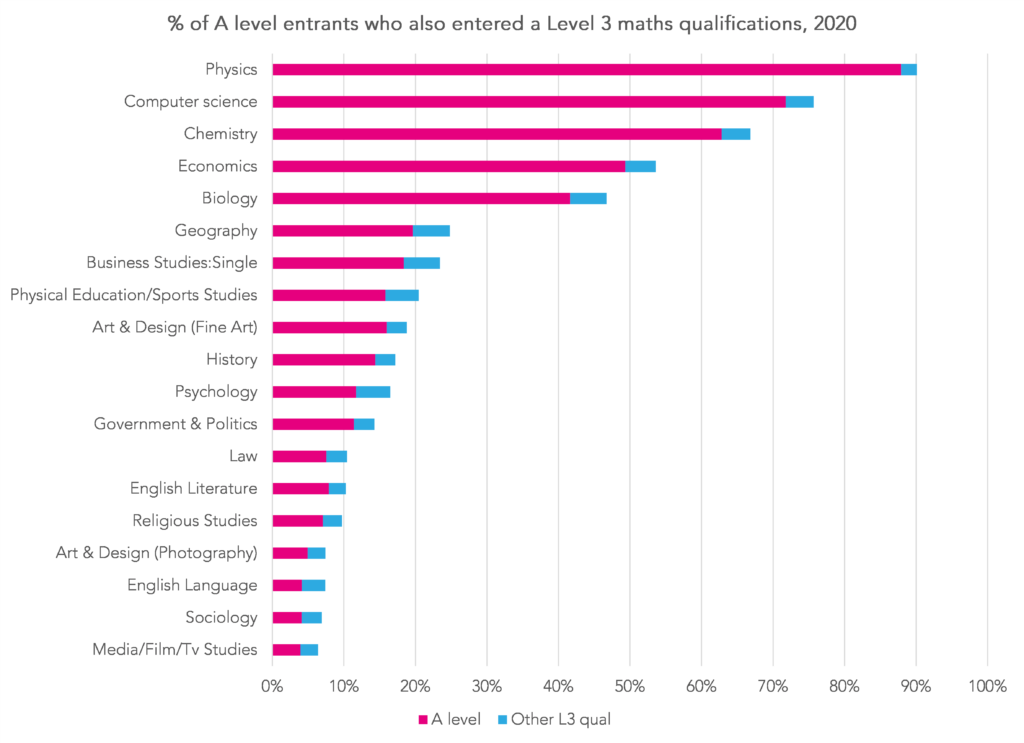
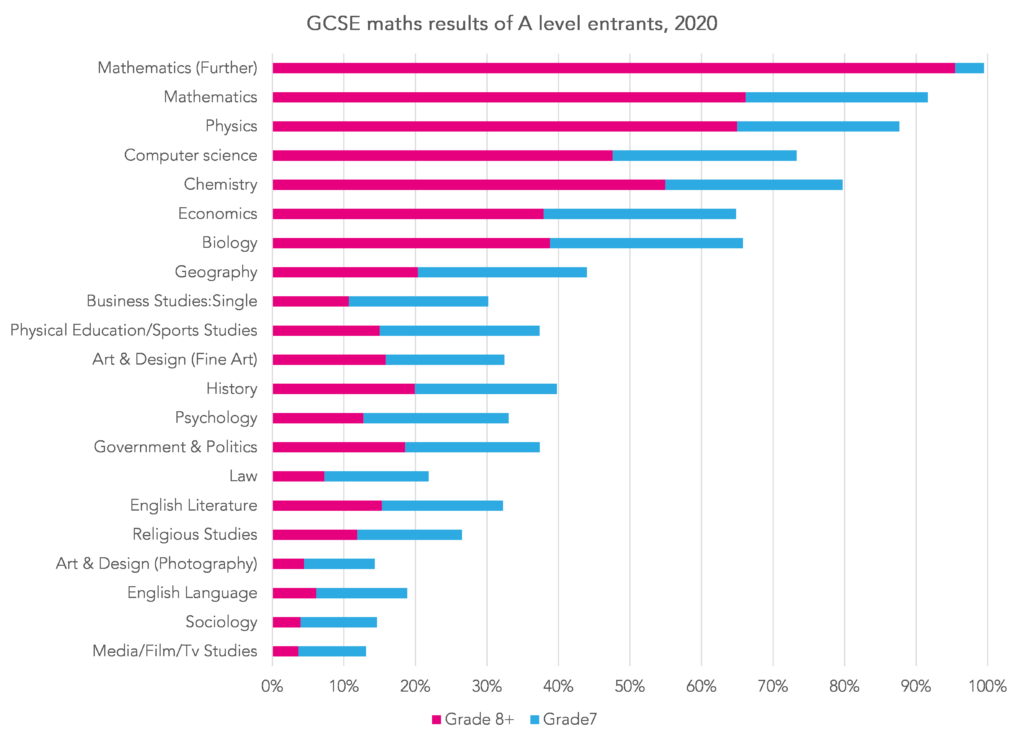
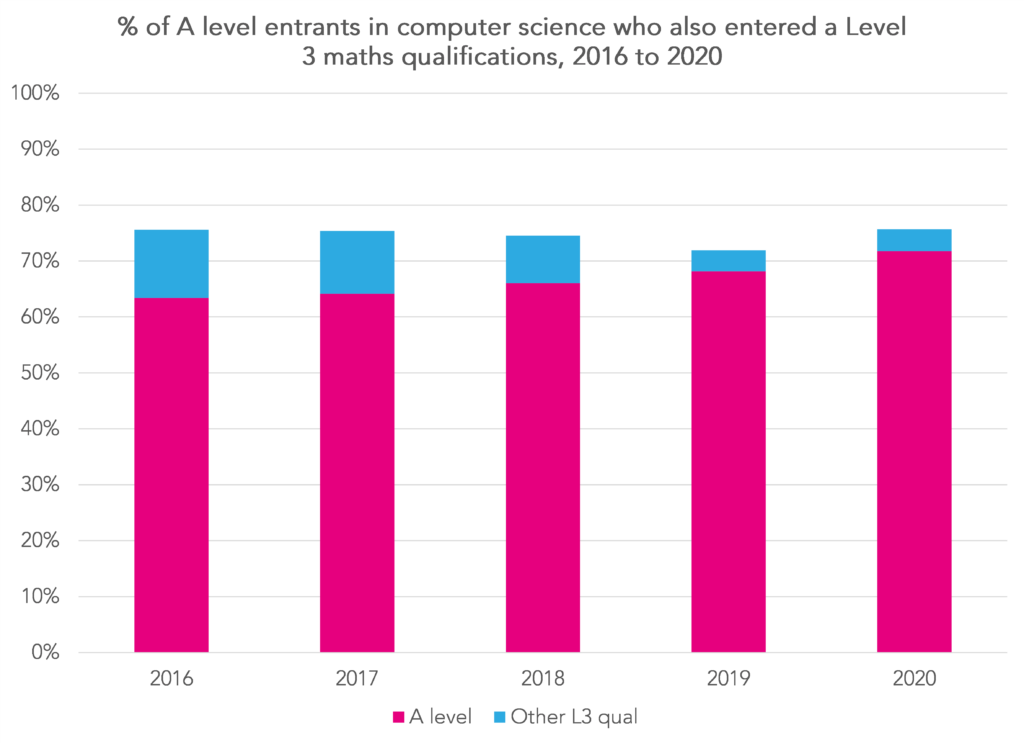
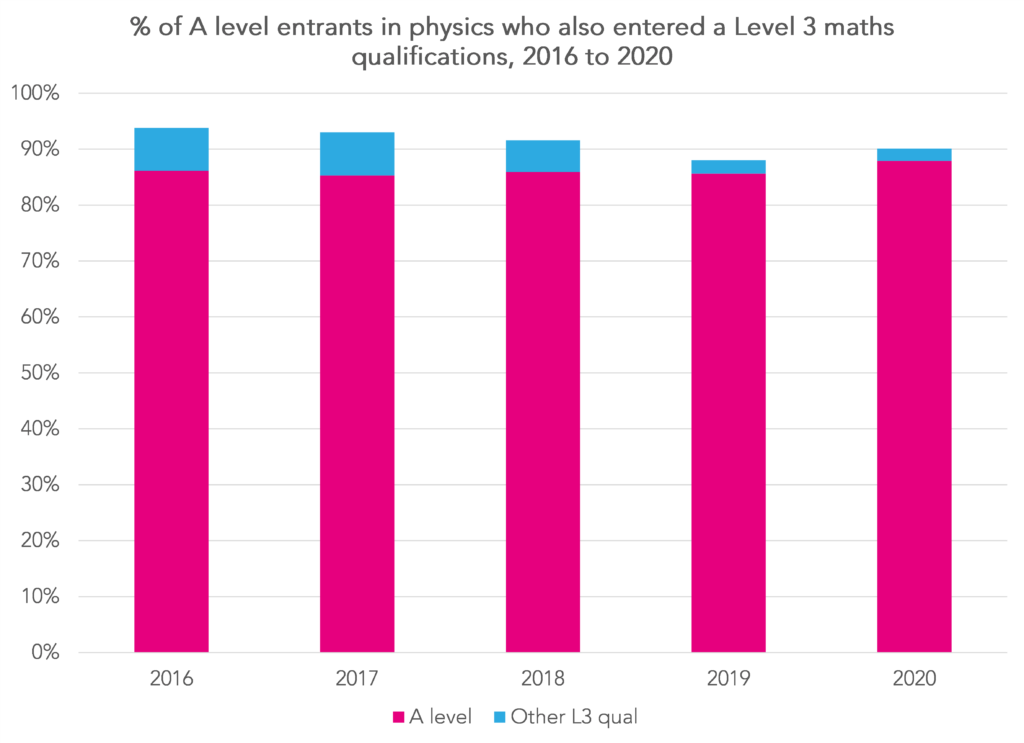
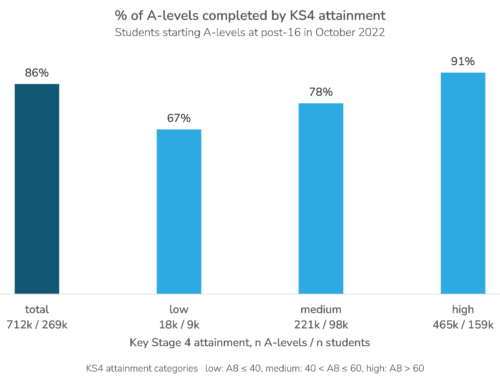
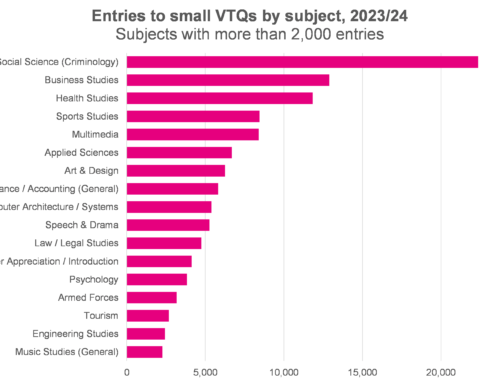

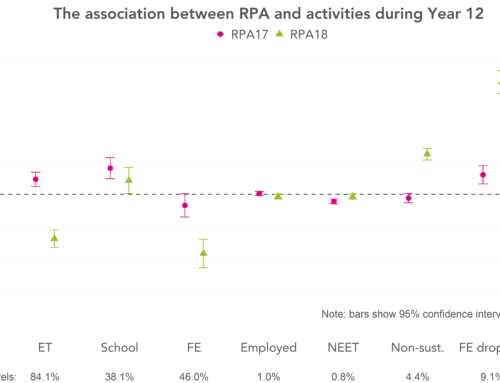
It’s true that there is a group of young people whose interests lie in the realms of physics and/or mathematics and/or CS. But many schools and colleges also recommend as opposed to require) Level 3 study of mathematics for students wanting to take Physics and/or CS, in part because there are synergies in their study, but also because university study in these or related areas, such as engineering, draws heavily on mathematics. Why that makes the curriculum ‘narrow’ any more than many other combinations of subjects are ‘narrow’, I fail to see! It’s also important to note that the data above also point to many young people studying physics or CS without mathematics. Given that mathematics is the underlying language of both, and mathematical thinking the bedrock of much post-school activity across a wide and ever-increasing range of fields, I would argue that continuing to deepen one’s mathematical fluency through e.g. the study of Core Maths, would benefit all those students – and many others. As to the question of what pathways to post-16 study of physics and CS work well, there is little pertinent information here, but their post-18 study we know is likely to benefit from not just continuing engagement with mathematics, including data literacy, and a variety of digital literacies, but with communication via a variety of media and with a variety of audiences, with team working, collaboration and enterprise….so the question might well, instead, be ‘how does our post-16 education provision need developing for a changing world?
Hi Jennie. Really insightful, thank you. Your question at the end is a good one- if we want to increase participation in A level physics then what needs to happen?
Agree with Jennie above, from a straw poll of our cohort of Physicists (my subject) most chose it as a vocational route to either Physics or Engineering, possibly meaning the Matsh choice was also driven by the vocational need. We do have some who choose ophysics just for the love, eg with humanities or languages as as their university course enablers, but we also get those that didnt realise just how great deeper Phsyics was and cant go further without A level Maths leading to foundation courses or gap years of additioanl A levels..
Interesting the correclation between CS and maths, but possilby both appeal to “methodical / structured thinking” or are even more iontertwined when taken further certainlyn when using software to model something required a maths understanding. OR maybe both subjects require the least number of actual grammatical sentences to be written and you can be sure to avoid any essay homeworks!
If students want to study Computer Science at university they need A-Level Maths, they don’t need to take Computer Science at A-Level e.g. Manchester University offer: A*A*A* with an A* in Maths, and a minimum of one Science subject at A*.
I wonder if students taking Physics and CS also take Maths because universities require A Level Maths for courses such as engineering ?
As the mum of a Y9 son, I am concerned that his school don’t offer a Computer Science GCSE but a vocational IT qualification which includes no coding. Will this disadvantage him at A level, University and life? I have heard that another local Secondary school does Computer Science. When I asked my son’s sschool they said that hardly any students would do it because it’s a difficult subject and it wasn’t viable to have a small group of students doing it. I have also heard it is hard to recruit CS teachers. Is this the same in private schools I wonder? I just feel let down that it’s just luck that your child gets to study CS to GCSE. My son is really interested in Physics, Chemistry and Biology. He is in the top set for Maths but doesn’t have a love for it to be honest. I am hoping he gets to study the 3 separate Sciences – he is in the top set for those too – we will find out soon. He went on a visit to a Universirty recently and told them he would like to study Physics. He has talked about being an Astrophysicist but although this is ambitious, are there many jobs? Sorry to go off tangent – I think he may choose Physics at A level.so worry he won’t choose Maths as he hasn’t got that love for it even though he is quite capable. The CS really worries me too as feel he will be at a disadvantage not having a GCSE in it. Sorry to wrote so much. Any advice would be lovely. Thank you. PS I did A level Maths but found the jump.from GCSE to A level really difficult – it that still the case? I want my son to choose A levels he enjoys but he has to balance that with his options for the future. He has enjoyed Engineering at school too but because of Covid he has missed some practical aspects. He attends at STEM club.
AI: Please do not worry about computing GCSE. Many schools cannot offer it, and many choose not to offer it (including some highly academic independent schools). Many schools do not offer A Level computing either, which is one of the reasons that universities require maths A level for computing degrees but usually do not require computing A level.
There is a wealth of information available online about coding, most of it for free- any child interested in coding will be well beyond the GCSE requirements by the time they’re 13/14, and it will be mainly self-taught due to interest. I say this as my father, two siblings, and my husband are all software engineers, and one of my children is heading that way too. None of them have GCSE Computing, and only 1 has the A Level. Python is probably a good starting place these days.
Don’t worry too much about his interest in maths either- the maths your son has studied so far are stepping stones/ tools to learning the higher level, far more interesting stuff that he will begin to come across in the next few years. Get him started on maths puzzles such as those in the books of Martin Gardner, Ian Stewart, and Alex Bellos – far more interesting than what he’ll be doing in school. With the development of space ports in the UK I am sure there will be a positive future for astrophysicists.
Thank you so very much for your reply. It was so kind of you. It has made me feel less worried. Thank you for the advice which I will take onboard and for the tips for the activities and resources too. I will definitely have a look at those with a view to getting him them. X